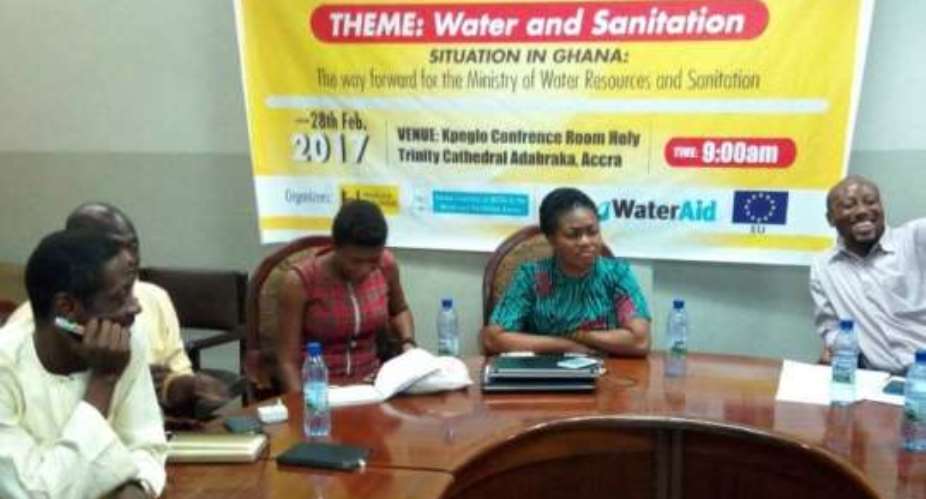By Deborah Apetorgbor, GNA
Accra, Mar. 1, GNA - The Coalition of Non-Governmental Organisations in Water and Sanitation (CONIWAS) has tasked the new Ministry of Sanitation and Water Resources to eliminate all obstacles inhibiting the effective implementation of sanitation bye-laws.
The group said though education and sensitisation on sanitation and water had been progressive, lack of enforcement of the law had and would continue to have negative impacts on the effective execution of most initiatives in the sector.
Mr Benjamin Lartey, Spokesperson of the Civil Societies and Community Groups in Water and Sanitation Hygiene (WASH), at a media briefing on Wednesday, said though laws existed in the country against environmental degradation and sanitation, enforcement was weak and that had resulted in the poor sanitation condition prevalent today.
'There is every indication that our enforcement institutions do not have the required capacities to enforce the laws,' he said and added that many people continuously flout the laws yet go unpunished as the laws were not enforced to prosecute offenders.
He implored the Sanitation and Water Resources Minister to focus his attention and energy to section six of the Millennium Development Goals (SGDs) which stipulate the improvement in water quality, reduction in pollution, and the protection of water-related ecosystems.
Mr Lartey noted that these targets 'are necessary for Ghana as the value for renewable internal sources of freshwater resources per capita had reduced drastically from 4,276 in 1962 to 1,131 in 2014,' within a span of 52 years.
He observed that as much as education and sensitisation were powerful tools to combat sanitation challenges, enforcement of the bye-laws also played an indispensable role in realising the SDGs.
The WASH expert also mentioned that government had to complement the efforts of various households financially in the provision of household toilet facilities, as presently 'there was no clear funding mechanism for household toilets', and the burden of cost could not rest on the households alone.
He said more than five million people practised open defecation, with only a meagre 15 per cent Ghanaian households using improved household toilets adding that the problem of open defecation had to be tackled at the root as they were no decent toilets at home.
CONIWAS therefore believed that a sure way to reverse the situation would be for the Ministry of Sanitation and Water Resources to 'pay particular attention to financing household toilet facilities by establishing a fund at the district level,' adding that a percentage of the District Assemblies' Common Fund could be set aside for that purpose.
The Coalition however pledged its support to the sector Ministry as it had gathered a wealth of experience since its establishment in 2003.
Present at the media briefing were 10 Civil Society Groups, 10 Community groups and representations from the media.
GNA





 We’ll protect state wealth from opaque deals – Prof Jane Naana
We’ll protect state wealth from opaque deals – Prof Jane Naana
 Mauritania president says running for second term in June polls
Mauritania president says running for second term in June polls
 I won't ever say I was a mere driver’s mate' — Prof. Opoku-Agyemang
I won't ever say I was a mere driver’s mate' — Prof. Opoku-Agyemang
 2024 polls: 'EC struggling to defend credibility'— Prof. Opoku-Agyemang
2024 polls: 'EC struggling to defend credibility'— Prof. Opoku-Agyemang
 Akufo-Addo gov't's 'greed, unbridled arrogance, unrestrained impunity, sheer dis...
Akufo-Addo gov't's 'greed, unbridled arrogance, unrestrained impunity, sheer dis...
 Election 2024: Ghana needs an urgent reset, a leadership that is inspiring – Ma...
Election 2024: Ghana needs an urgent reset, a leadership that is inspiring – Ma...
 Partner NDC to rollout a future of limitless prospects – Prof Jane Naana Opoku-A...
Partner NDC to rollout a future of limitless prospects – Prof Jane Naana Opoku-A...
 NPP will remain in gov’t till Jesus comes — Diana Asamoah
NPP will remain in gov’t till Jesus comes — Diana Asamoah
 Sunyani Technical University demands apology from former SRC president over sex-...
Sunyani Technical University demands apology from former SRC president over sex-...
 'Dumsor' was resolved by Mahama but ‘incompetent' Akufo-Addo has destroyed the g...
'Dumsor' was resolved by Mahama but ‘incompetent' Akufo-Addo has destroyed the g...
